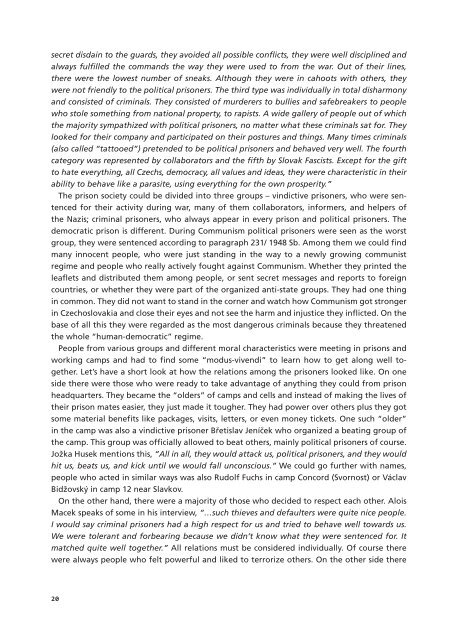Czechoslovak Political Prisoners - über das Projekt Political ...
Czechoslovak Political Prisoners - über das Projekt Political ...
Czechoslovak Political Prisoners - über das Projekt Political ...
Create successful ePaper yourself
Turn your PDF publications into a flip-book with our unique Google optimized e-Paper software.
secret disdain to the guards, they avoided all possible conflicts, they were well disciplined and<br />
always fulfilled the commands the way they were used to from the war. Out of their lines,<br />
there were the lowest number of sneaks. Although they were in cahoots with others, they<br />
were not friendly to the political prisoners. The third type was individually in total disharmony<br />
and consisted of criminals. They consisted of murderers to bullies and safebreakers to people<br />
who stole something from national property, to rapists. A wide gallery of people out of which<br />
the majority sympathized with political prisoners, no matter what these criminals sat for. They<br />
looked for their company and participated on their postures and things. Many times criminals<br />
(also called “tattooed”) pretended to be political prisoners and behaved very well. The fourth<br />
category was represented by collaborators and the fifth by Slovak Fascists. Except for the gift<br />
to hate everything, all Czechs, democracy, all values and ideas, they were characteristic in their<br />
ability to behave like a parasite, using everything for the own prosperity.”<br />
The prison society could be divided into three groups – vindictive prisoners, who were sentenced<br />
for their activity during war, many of them collaborators, informers, and helpers of<br />
the Nazis; criminal prisoners, who always appear in every prison and political prisoners. The<br />
democratic prison is different. During Communism political prisoners were seen as the worst<br />
group, they were sentenced according to paragraph 231/ 1948 Sb. Among them we could find<br />
many innocent people, who were just standing in the way to a newly growing communist<br />
regime and people who really actively fought against Communism. Whether they printed the<br />
leaflets and distributed them among people, or sent secret messages and reports to foreign<br />
countries, or whether they were part of the organized anti-state groups. They had one thing<br />
in common. They did not want to stand in the corner and watch how Communism got stronger<br />
in <strong>Czechoslovak</strong>ia and close their eyes and not see the harm and injustice they inflicted. On the<br />
base of all this they were regarded as the most dangerous criminals because they threatened<br />
the whole “human-democratic” regime.<br />
People from various groups and different moral characteristics were meeting in prisons and<br />
working camps and had to find some “modus-vivendi” to learn how to get along well together.<br />
Let’s have a short look at how the relations among the prisoners looked like. On one<br />
side there were those who were ready to take advantage of anything they could from prison<br />
headquarters. They became the “olders” of camps and cells and instead of making the lives of<br />
their prison mates easier, they just made it tougher. They had power over others plus they got<br />
some material benefits like packages, visits, letters, or even money tickets. One such “older”<br />
in the camp was also a vindictive prisoner Břetislav Jeníček who organized a beating group of<br />
the camp. This group was officially allowed to beat others, mainly political prisoners of course.<br />
Jožka Husek mentions this, “All in all, they would attack us, political prisoners, and they would<br />
hit us, beats us, and kick until we would fall unconscious.” We could go further with names,<br />
people who acted in similar ways was also Rudolf Fuchs in camp Concord (Svornost) or Václav<br />
Bidžovský in camp 12 near Slavkov.<br />
On the other hand, there were a majority of those who decided to respect each other. Alois<br />
Macek speaks of some in his interview, “…such thieves and defaulters were quite nice people.<br />
I would say criminal prisoners had a high respect for us and tried to behave well towards us.<br />
We were tolerant and forbearing because we didn’t know what they were sentenced for. It<br />
matched quite well together.” All relations must be considered individually. Of course there<br />
were always people who felt powerful and liked to terrorize others. On the other side there<br />
20


